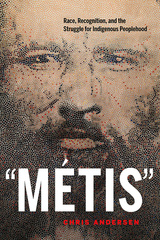
Bead by Bead
Constitutional Rights and Métis Community
What does the phrase Métis peoples mean in constitutional terms? As lawyers and scholars dispute forms of Métis identity, and debate the nature and scope of Métis rights under the Canadian Constitution, understanding Métis experience of colonization is fundamental to achieving reconciliation.
In Bead by Bead, contributors address the historical denial – at both federal and provincial levels – of outstanding Métis concerns and Aboriginal rights claims, in particular with respect to land, resources, and governance. Tackling such themes as ongoing colonial policies, the invisibility of Métis women in court decisions, identity politics, and racist legal principles, they uncover the troubling issues that plague Métis aspirations for a just future.
This nuanced analysis of the parameters that current Indigenous legal doctrines place around Métis rights discourse moves beyond a one-size-fits-all definition of Métis or a uniform approach to Aboriginal rights. By raising critical questions about self-determination, colonization, kinship, land, and other essential aspects of Métis lived reality, these clear-eyed essays go beyond legal theorizing and create pathways to respectful, inclusive Métis-Canadian constitutional relationships.
This book is essential reading for scholars and students of Métis and Indigenous studies and Aboriginal law, as well as for lawyers, politicians, and civil servants engaged in Métis issues.
Finally, we have a source that in a single place provides material and commentary that will support informed debate and help to come to grips with the questions of Métis identity, community, and constitutional rights ... This book accurately addresses who we are: a people with common values, traditions, culture, way of life, family ties, history, communities, and shared territory ... There is no question of its value, the knowledge we gain from it, and how it will augment everyone’s perspective of the issues of the Métis.
Yvonne Boyer is a Michif with her Métis ancestral roots in the Red River. She was the associate director of the Centre for Health Law, Policy and Ethics, part-time professor of law at the University of Ottawa, and is the author of Moving Aboriginal Health Forward: Discarding Canada’s Legal Barriers. She was appointed to the Senate of Canada in 2018. Larry Chartrand is a citizen of the Métis Nation (Michif), professor emeritus in the Faculty of Law at the University of Ottawa, and a former director of the Indigenous Law Centre at the University of Saskatchewan. He was the principal investigator for a SSHRC research project on Métis treaties that led to Métis Treaties in Canada: Past Realities and Present Promise.
Contributors: Brodie Douglas, Karen Drake, Christopher Gall, Adam Gaudry, Sébastien Grammond, Brenda L. Gunn, Thomas Isaac, Wanda McCaslin , Darren O’Toole, Jeremy Patzer, Signa A. Daum Shanks, D’Arcy Vermette
Foreword / Tony Belcourt
Introduction / Yvonne Boyer, Larry Chartrand, and Wanda McCaslin
1 Métis Identity Captured by Law: Struggles over Use of the Category Métis in Canadian Law / Sébastien Grammond
2 Recognition and Reconciliation: Recent Developments in Métis Rights Law / Thomas Isaac
3 Shifting the Status Quo: The Duty to Consult and the Métis of British Columbia / Christopher Gall and Brodie Douglas
4 The Resilience of Métis Title: Rejecting Assumptions of Extinguishment / Adam Gaudry and Karen Drake
5 Where Are the Women? Analyzing the Three Métis Supreme Court of Canada Decisions / Brenda L. Gunn
6 Manitoba Metis Federation and Daniels: "Post-Legal" Reconciliation and Western Métis / Jeremy Patzer
7 Colonial Ideologies: The Denial of Métis Political Identity in Canadian Law / D’Arcy Vermette
8 Métis Aboriginal Rights: Four Legal Doctrines / Darren O’Toole
9 Suzerainty, Sovereignty, Jurisdiction: The Future of Métis Ways / Signa A. Daum Shanks
Afterword / Yvonne Boyer and Larry Chartrand
Index












